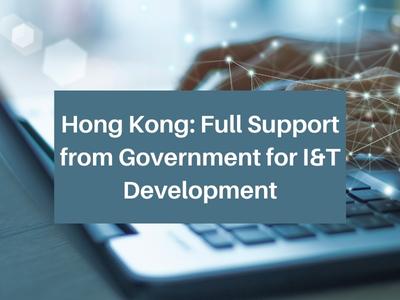Hong Kong’s I&T Development Gets Maximum Support From the Government
 Hong Kong’s Chief Executive addressed the Innovation and Technology Scholarship, which was awarded to 25 students. The recipients are the brightest talents chosen from six local universities; the recipients were qualified due to their outstanding performance in their field of studies and thirst for accumulating novel experiences. Awardees are encouraged to make to master their craft and connect with peers and mentors worldwide. The recipient’s development abroad is poised to shape their futures and Hong Kong’s future in related fields.
Hong Kong’s Chief Executive addressed the Innovation and Technology Scholarship, which was awarded to 25 students. The recipients are the brightest talents chosen from six local universities; the recipients were qualified due to their outstanding performance in their field of studies and thirst for accumulating novel experiences. Awardees are encouraged to make to master their craft and connect with peers and mentors worldwide. The recipient’s development abroad is poised to shape their futures and Hong Kong’s future in related fields.
The Executive elaborated that Hong Kong’s development lies in future generations. The vitality of cultivating a competent generation prompted the Government to take proactive measures such as investing in I&T development. The Government needs to sow the seeds of succession by improving educational standards in local universities to facilitate the growth of young people in the I&T sector.
She proposed the continuation of the Research Matching Grant Scheme for two more years, allowing the eight University Grants Committee (UGC)-funded universities to access additional finances. Simultaneously, she also coaxed the private sector to aid in research efforts by the universities. The over-enrolment ceiling has also been eased for research by postgraduate students, allowing universities to allocate resources to hone the research skills displayed by students.
The central Government acknowledges the country’s knack for the sector and is part of the National 14th Five Year Plan. This plan will assist Hong Kong in having a globally recognized I&T sector. Furthermore, the plans for setting up the Guangdong-Hong Kong-Macao Greater Bay Area will be in motion as it will potentially substantiate the science and technology merger with Mainland China, nationally and locally.
Hong Kong has 16 State Key Laboratories, six Hong Kong Branches of Chinese National Engineering Research Centres, and 22 partnering laboratories with the Chinese Academy of Sciences. Under InnoHK, two research clusters at the Hong Kong Science Park have successfully unified over 30 universities. Of these, 28 are working on healthcare technologies, artificial intelligence, and robotic technologies.
The COVID-19 pandemic necessitates the need for developing life and health sciences and has since been a tough curve to navigate despite efforts made by the universities. 16 lab clusters and eight State Key Laboratories are concentrating on life and health development using the pandemic as a premise. The InnoLife Healthtech Hub in the Hong Kong-Shenzhen Innovation and Technology Park focuses on research and development efforts while serving as global collaboration in life and health sciences. The Executive expressed that some students are pursuing correlated subjects such as medicine and biomedical sciences, creating an opportunistic venture for emerging research.
Besides R&D, Hong Kong’s startup scene is thriving. Venture capitalist funding increased from $10 billion in 2017 to $40 billion last year. This becomes an avenue for students intending to pursue the entrepreneur life, with the number of startups increasing from 2 229 in 2017 to 3 755 in 2021. The Government welcomes the growth of startups, primarily in the technological sector, to further assist young entrepreneurs by initiating schemes like the Startup Support Scheme for Universities so students may employ the aid and establish their businesses by publishing their R&D findings.
The Innovation & Technology Venture Fund also ushers in private investment in domestic I&T startups via dual-investment options with venture capital funds. As the Government wholeheartedly sustains the Hong Kong Science and Technology Parks Corporation and Cyberport, various incubation programs and investment funds were put in place for local champion startups by encouraging cross-sector collaboration with the scholarship, leading the way.








